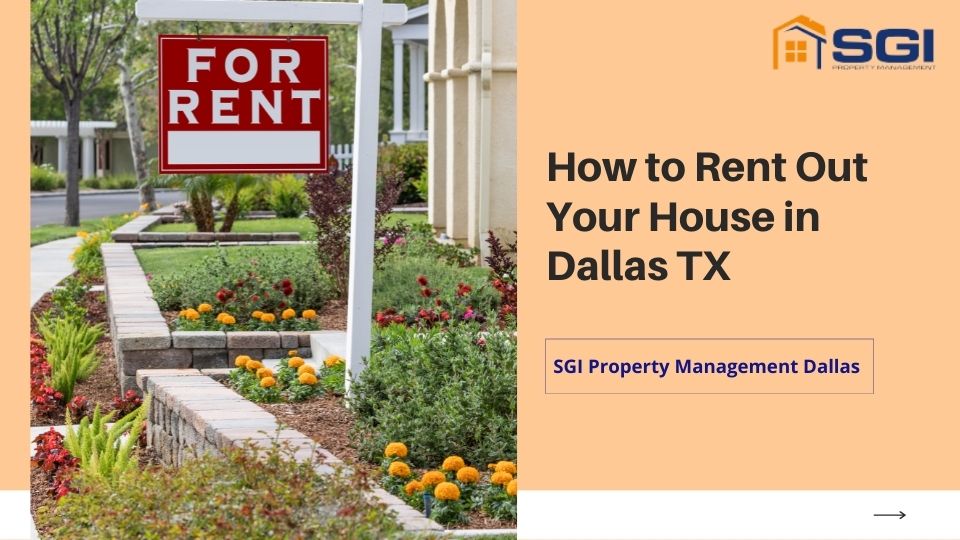
Renting your Dallas home instead of selling it can be a smart move. You may be able to diversify your income stream, widen your investment portfolio, and create wealth through increasing appreciation rates.
But while anyone can rent out their property, not everyone is cut out to be a landlord. Despite what you may believe, it takes a certain set of skills and experience.
This list by SGI Dallas includes what you’ll need to successfully rent out your home.
1. Understand your responsibilities.
When it comes to renting out a house, landlords have a range of responsibilities. For starters, here’s what you’ll be expected to do when you become a landlord:
- Provide your tenant with livable premises.
- Respond to maintenance issues on time.
- Draft a legally compliant lease agreement.
- Treat your tenants respectfully and fairly, as per the Fair Housing Act.
- Ensure your tenant can enjoy the rental without noise or disruption.
2. Do the math.
If you’re like most rental investors, your goal in renting out your house is to generate passive income.
As such, you'll want to do some calculations in order to see whether or not investing in Dallas real estate is going to be worthwhile.
So, begin by estimating your expenses. Common expenses include property taxes, insurance, and mortgage payment. Next, figure out the rent price.
Speaking of the rent…
3. Determine the rental price.

This is critical! It can make all the difference for you.
If you price your rental property incorrectly, you risk either leaving money on the table or making the unit unappealing to prospective tenants. The right rent amount should:
- Ensure optimal profits.
- Ensure the property remains desirable in the eyes of applicants.
- Be in line with local laws.
Broadly speaking, the right rent amount lies anywhere between 0.8- and 1.1% of the property’s value. So, if your property is valued at $200,000, then you should probably rent it out at between $1,600 and $2,200 a month.
That’s just gross income, though. To estimate your monthly profits, you’ll need to subtract your expenses from the rent price. If you rent your house furnished, you may be able to charge more.
4. Get your home ready to rent.
The city of Dallas has a competitive rental market. According to one source, about 59% of Dallas residents live in rented homes.
Basically, this means that you’ll be running into some competition when you rent out your house.
So, how can you ensure that a renter chooses your home rather than the one down the block? Well, here are a couple of things you can do to make it stand out:
- Give your walls a fresh coat of paint. If they look old and dingy, a fresh coat of paint can go a long way in revitalizing them. Choose neutral colors.
- Spice up the curb appeal. First impressions matter. Among other things, redo the walkway, trim bushes, and add some lights.
- Clean your home. You might want to hire professional cleaners to get the best results.
- Fix any repair issues. Fix leaky faucets, check the batteries in your smoke detectors, replace clogged AC filters, and clear the gutters.
5. Familiarize yourself with Texas landlord-tenant laws.

Just like other states, Texas has a statewide landlord-tenant act in place. Its purpose is to bring order when it comes to the relationship between a landlord and a tenant.
The following are some of the laws contained in that act:
- Fair Housing Laws. As a landlord, you’re prohibited from engaging in any discriminatory acts against your tenant on the basis of their protected characteristics. According to the Texas Commission on Human Rights, some of the protected characteristics include color, race, sex, religion, disability, age, and national origin.
- Eviction Laws. In Texas, tenants gain certain rights once they start renting out a property. As such, you cannot just kick them out as you like. You must follow the step-by-step eviction process.
- Warranty of Habitability. As a landlord, you’re legally required to keep your rental premises livable in Texas. If you don’t, your tenant can have several legal options to pursue. This includes the right to “repair and deduct” from rent.
- Security deposit laws. The Texas Property Code (§92.101 – §92.109) protects the right of renters regarding their security deposit.
6. Draft up a lease agreement.
It’s in your best interests to protect not only yourself but also your property from potential issues. That’s where a lease agreement comes in place. Among other things, it sets out the rights and responsibilities each party has to the lease.
A solid lease agreement should answer the following questions:
- How much is the rent amount?
- When and where should rent be paid?
- How many occupants are allowed in the unit?
- Are pets allowed?
- Can a tenant smoke inside the unit?
- What does a tenant need to do in order to break their lease?
- Can tenants make changes to their unit?
Drafting a lease agreement is only half the equation, however. The other step is to ensure that it is legally binding. So, have a qualified attorney or an experienced property management company go over it.

7. Hire a property management company.
Owning a rental property and managing it are two very different things. While anyone can certainly own a property, managing a rental property takes a lot of work and experience.
A comprehensive property management company can help you in all aspects of property management, such as rent collection, property maintenance, filling vacancies, and even kicking out irresponsible tenants.
Renting out a house in Dallas can come with many lucrative perks. That being said, it isn’t a quick way to instant income.
What’s more, knowledge of certain skills is necessary to be successful. If you're just starting out, hiring a team of experienced experts is the best option for you!









